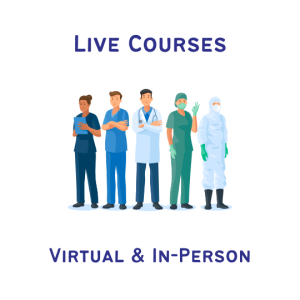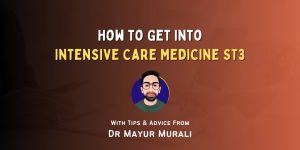
Published May 8, 2022 | Updated October 18, 2023
By MedCourse
Useful, relevant, and interesting content for UK Junior Doctors.
Adrenaline junkies rejoice!
Doff your bike helmet, slam the remains of your coffee, and have a gander at the options that Acute Care Common Stem (ACCS) Training can bring to those who like their medicine with a side helping of adrenaline.
If you like a bit of variety in your work, ACCS brings you rotations across Emergency Medicine, Acute Medicine, Anaesthetics, and Intensive Care Medicine (ICM) – giving you some flexibility in your future career.
Confused about how it all works? You’re not alone.
In this guide, we’ll go through the training pathways available, whether you should apply, and the curriculum.
The ACCS Training Pathway
Acute Care Common Stem (ACCS) training is a broad-based training programme for post-FY2 doctors that gives trainees experience in Emergency Medicine, Acute Medicine, Anaesthetics, and Intensive Care Medicine. The aim is to give trainees a broader understanding of all things acute while offering more flexibility to change career direction down the line.
Training is made up of three separate programmes – ACCS EM (Emergency Medicine), ACCS Anaes (Anaesthetics), and ACCS IM (Internal Medicine – previously known as ACCS AM for Acute Internal Medicine). All three programmes share the same curriculum and rotations for the first 2 years, then diverge for the final 1-2 years to fulfil the training requirements of their respective specialities.
The first two years of training are the same across all three programmes:
- Emergency Medicine – 6 months
- Acute Medicine – 6 months
- Anaesthetics – 6 months
- Intensive Care Medicine – 6 months
The programmes then diverge into training for their respective specialities for a further 1-2 years.

For emergency medicine trainees, ACCS-EM is the only available core training programme and only requires one additional year after the initial phase, with the duration of training expected to total 3 years. Trainees can then apply for ST4 higher speciality training in Emergency Medicine.
For both ACCS-IM and ACCS-Anaes, however, the programme is a 4-year alternative to their 3-year core training programmes – Internal Medicine Training and Core Anaesthetics Training. This means that following 2 years of broad-based training, you must undertake an additional 2 years to meet the requirements to apply for higher speciality training (ST4).
Should you have a change of heart during training, it’s much easier to switch to another ACCS speciality than if you had chosen a traditional core training programme. This pathway also opens up more options for obtaining an additional CCT (certificate of completion of training) in Intensive Care Medicine (ICM).
Acute Care Common Stem – Emergency Medicine (ACCS EM)
This is a 3-year programme and is the only available core training route for emergency medicine. Following two years of broad-based training (which includes 6 months of emergency medicine), the final year of ACCS-EM focuses on trauma and paediatric emergency medicine
Trainees use the kaizen e-portfolio to document their curriculum progress and work-based assessments, but in the first two years of training share the same core learning outcomes as their ACCS counterparts.
Before continuing in higher speciality training, trainees must complete three life support courses – ALS, ATLS, and APLS (or equivalent) – undertake level 3 safeguarding children training and pass the three MRCEM exams.
Acute Care Common Stem – Internal Medicine (ACCS IM)
Previously known as ACCS-AM, this is a 4-year programme and is an alternative to the Internal Medicine Training (IMT) programme. After 2 years of broad-based training, ACCS IM trainees follow the IMT programme at the IMY2 level, with the same requirements for completion of the programme.
While ACCS-IM trainees will have to train for an extra year, the extra time gives them a better understanding of emergency care and a better opportunity to boost their ST4 application points. Choosing this path to higher speciality training means spending an extra year to gain competencies in emergency medicine, intensive care, and anaesthetics.
ACCS Internal Medicine shares the same recruitment and application process as IMT, using the same self-assessment score, with both undergoing the same IMT interview.
ACCS IM vs IMT
While the sister programme, Internal Medicine Training (IMT), is a 3-year training programme, the ACCS-IM programme contains additional training in emergency medicine and anaesthetics and therefore requires an additional year to complete. ACCS-IM trainees take part in the equivalent of IMY2 & IMY3 in their CT3 and CT4 years.
If you choose this programme, you will spend approximately 6 months less time in medical specialities when compared to IMT. During the final 2 years of ACCS-IM, trainees are expected to pass the three MRCP exams. After completion, trainees can apply for ST4 posts in higher medical specialities.
The ACCS-IM programme also shortens higher speciality training in Intensive Care Medicine if you choose to pursue an Acute Medicine/Intensive Care Medicine dual CCT.
Acute Care Common Stem – Anaesthetics (ACCS Anaes)
This is a 4-year programme and is an alternative to the Core Anaesthetics Training programme. Following the first 2 years, ACCS Anaesthetics trainees will undergo a further 2 years of training in anaesthetics to meet requirements for higher speciality training.
Taking the ACCS Anaesthetics path means spending an extra year in training compared to core anaesthetics training, to receive training in emergency medicine, acute medicine, and intensive care medicine. While this involves an extra year, it is an excellent option for anaesthetics trainees who wish to pursue a career in intensive care medicine.
ACCS Anaesthetics is recruited via the same pathway as Core Anaesthetics, with both undergoing the same CT1 anaesthetics interview.
During the final 2 years of ACCS Anaesthetics, trainees are expected to pass the three FRCA primary exams. Following completion, trainees can apply for ST4 anaesthetics.
ACCS Anaes vs Core Anaesthetics
Core Anaesthetics Training is a 3-year training programme, whereas trainees in Acute Care Common Stem Anaesthetics undertake an additional 6 months in both acute medicine and emergency medicine, meaning it is a 4-year programme.
If you choose the ACCS Anaes training programme you will share the same 2 first years of training as your emergency and internal medicine counterparts. You will then diverge and join the Core Anaesthetics curriculum at a CT2 equivalent level for your CT3 and CT4 years. You will spend the same amount of time in anaesthetics and intensive care as core anaesthetics trainees.
Should I Do ACCS?
Do you want to train in Emergency Medicine? If the answer is yes and you want to join a structured core training programme, then this pathway is your only option.
For Anaesthetics and Internal Medicine, however, why should you choose ACCS rather than IMT and Core Anaesthetics training?
Here are a few reasons why you might want to consider acute care common stem (ACCS) training over traditional core training routes:
Reason 1: Exposure to Acute and Emergency Care
While all three parent specialities will inevitably lead to involvement in resuscitation, cardiac arrests, and emergencies in general, acute care common stem gives you the chance to see how emergencies are treated and escalated across departments.
While in the Emergency Department, you’ll learn how to triage and treat emergencies from all specialities. If you’re pursuing a career in a medical speciality this may be your only opportunity to get hands-on with surgical, obstetric, and psychiatric emergencies – which may come in handy during crash calls!
Training also guarantees access to education you might not otherwise receive, including safe sedation, airway management, and invasive medical procedures.
Reason 2: Gain Confidence and Understanding
If you choose this training pathway you’ll start to feel more comfortable in all types of the hospital environment, including:
- Theatres
- Inpatient Wards
- The Emergency Department
- The Intensive Care Unit
You may end up thanking yourself for the exposure to these environments when you end up there during an emergency. Not only this but having worked in these departments you’ll have a much better understanding of how these teams work and what resources they have available to them.
If you choose ACCS IM or Anaesthetics, you will have more skills available in your toolset – it might save having to plead for help from the busy medical registrar or first on-call anaesthetist.
Reason 3: Career Flexibility
Not everyone knows exactly where they’re headed in medicine. If you know that you like managing acute and emergency patients but don’t feel ready to fully commit to a speciality, this broad-based training programme might be the choice for you.
If you choose one of the specialities but later discover that you’re better suited to another, you have the option to re-apply to that speciality. Each branch will consider any of the training you’ve already completed in your first 2 years.
The training programme also helps you meet the requirements for complementary speciality experience if you wish to enter higher training in Intensive Care Medicine. If you wish to complete the CCT in your parent speciality and combine this for a dual CCT with Intensive Care Medicine, ACCS is arguably the best path to choose.
Important Qualities for a Trainee
While each subspecialty will have different skills and goals in their training, there are several qualities which interviewers and mentors will be looking for, mentioned in the ACCS person specification:
- Ability to perform well under pressure
- Hand-eye coordination
- Adaptable and cooperative
- Keen to learn procedural skills
- Enthusiastic about acute care
- Problem-solving and lateral thinking skills
The ACCS Curriculum
The curriculum for the first 2 years is identical across each subspeciality, though trainees must use their parent speciality’s e-portfolio.
The curriculum is based on 11 learning outcomes (LOs), which together fulfil requirements for the GMC’s “generic professional capabilities”. These LOs are:
- Care for physiologically stable adult patients presenting to acute care across the full range of complexity
- Make safe clinical decisions, appropriate to the level of experience, knowing when and how to seek effective support
- Identify sick adult patients, be able to resuscitate and stabilise and know when it is appropriate to stop
- Care for acutely injured patients across the full range of complexity
- Deliver key procedural skills
- Deal with complex and challenging situations in the workplace
- Provide safe basic anaesthetic care including sedation
- Manage patients with organ dysfunction and failure
- Support, supervise and educate
- Participate in research and manage data appropriately
- Participate in and promote activities to improve the quality and safety of patient care
Each placement of the first two years provides opportunities to fulfil different parts of this curriculum. Some speciality-specific skills you will learn include:
- Safe procedural sedation – Anaesthetics
- Management of invasive monitoring – Intensive Care Medicine
- Treating injuries and trauma – Emergency Medicine
- Managing the acute medical take – Acute Medicine
Each placement will also give you different opportunities to learn procedures to complete LO 5.
The ACCS Portfolio
Throughout training, you should give evidence for completing each learning objective by mapping portfolio forms to the conditions. These forms differ depending on which speciality portfolio you are using, and can include:
- ACAT – Acute Care Assessment Tool
- CbD – Case-based Discussion
- HALO – Holistic Assessment of Learning Outcome
- Mini-CEX – Mini-Clinical Evaluation Exercise
- MSF – Multi-Source Feedback
- TO – Teaching Observation
- ALS – Advanced Life Support
- DOPS – Direct Observation of Procedural Skills
- IAC – Initial Assessment of Competence
- MTR/MCR – Multiple Trainer Report/Multiple Consultant Report
- QIPAT – Quality Improvement Project Assessment Tool
- PDP – Personal Development Plan
- Logbooks
- Supervisor reports
- Reflections
While some core training programmes previously used lists of conditions that must be seen for a trainee to progress, ACCS does not ask for evidence of particular presentations and instead makes a recommendation that a trainee should become familiar with a number of conditions, found in the 2021 curriculum document.
ACCS Core Procedures
You are expected to learn these procedures in your first 2 years, in addition to speciality-specific procedures during the final 1 to 2 years.
- Pleural aspiration of air
- Chest drain: Seldinger and open technique
- Establish invasive monitoring (CVP and arterial line)
- Emergency vascular access – IO & femoral
- Fracture/dislocation manipulation
- External pacing
- DC cardioversion
- Point of care ultrasound-guided vascular access and fascia iliaca block
- Lumbar puncture
Study leave & Courses for ACCS trainees
As a trainee, you are permitted an annual entitlement of 30 days’ study leave – though any mandatory training days will be deducted from this. Study leave is a fantastic excuse to get away from the shop floor and focus on skills that you’re interested in, or feel are a weak point.
You will also have a study budget to use on paid courses from which you can pay for your course, as well as transport and accommodation. This must be signed off by your educational supervisor as well as your TPD, so don’t try to book a cheeky 5* hotel.
While some deaneries have unlimited study budgets (so long as you can convince your supervisor and TPD that it’s worth it), others set a hard limit on how much you can claim. You might be lucky though, as come January your TPD will likely have some extra funds in the budget that needs spending before the end of March.
By attending a course you can:
- Get a break from the day job
- Learn a new skill in a supervised environment
- Earn points for speciality applications
- Impress interviewers with commitment to speciality
- Work on a weak point in your skillset
Clinical Seminars & Workshops
Clinical courses are aimed at filling gaps in your knowledge and honing your skills. If you know of any clinical presentations that make you shake like a leaf when you come across them, this is a perfect way to learn without fear of judgement from your colleagues.
Courses that might suit trainees include:
- Simulation days
- Skills workshops such as an ECG course
- Treatment review seminars
- Clinical update courses
Exam Courses
Exams for core training are notoriously difficult and passing them is a requirement for progression to higher speciality training. If you’re at all worried about passing your exams then it’s worth booking an exam course.
For OSCE-based courses it’s vital that you have experienced the conditions you might face. While the day job does a decent job of preparing you for this, on a course you can find some of the more weird and wonderful presentations that you don’t come across often. It’s also a wonderful way to assess how good your examination and communication skills are.
Exams are specific to your parent speciality:
- MRCEM Primary
- MRCEM Intermediate SBA
- MRCEM OSCE
- MRCP Part 1
- MRCP Part 2 written
- MRCP Part 2 PACES
- FRCA Primary MCQ
- FRCA Primary OSCE
- FRCA Primary SOE
Procedural Skills Courses
Procedural skills are key in the first 2 years, and all parent specialities have specific procedures which need to be signed off before higher speciality training. Although the training programme will give you opportunities to learn mandatory procedures, you can get ahead of the curve by attending a course.
Ultrasound courses are also an excellent idea for ACCS trainees, making sure that you never fail an attempt at vascular access (though you might want to keep this quiet unless you want to spend your days putting in difficult cannulas on the wards). FUSIC/FAMUS courses will give you the skills to quickly assess acutely unwell patients to help with your management.
Professional Development Courses
Whether it’s patients, relatives, or colleagues, you will always need to keep on top of your professional development if you want to feel confident in your ability to manage difficult situations.
All placements in ACCS involve treating acutely unwell patients, so you must know how to communicate clearly and break bad news. By booking a communication course you’ll be able to make mistakes in front of a tutor rather than a patient.













